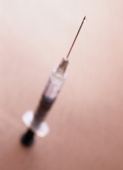- Could Your Grocery Store Meat Be Causing Recurring UTIs?
- Are You Making This Expensive Thermostat Error This Winter?
- Recognizing the Signs of Hypothyroidism
- 10 Strategies to Overcome Insomnia
- Could Artificial Sweeteners Be Aging the Brain Faster?
- Techniques for Soothing Your Nervous System
- Does the Water in Your House Smell Funny? Here’s Why
- Can a Daily Dose of Apple Cider Vinegar Actually Aid Weight Loss?
- 6 Health Beverages That Can Actually Spike Your Blood Sugar
- Treatment Options for Social Anxiety Disorder
Depo-Provera Linked to Higher HIV Risk, Researchers Find


The injectable birth control Depo-Provera is associated with an increased risk of HIV infection in women, according to a review of research in Africa.
Women who receive the so-called “birth control shot” have about 40 percent higher odds of becoming infected with HIV, compared to women using some other form of birth control or no birth control at all, researchers reported.
However, the review’s authors said that the increased risk does not outweigh the contraceptive benefits of Depo-Provera, particularly in the African nations where these studies took place.
Banning Depo-Provera would leave many women in developing countries without immediate access to alternative contraceptive options, which would likely lead to more unintended pregnancies, said lead author Lauren Ralph, an epidemiologist at the University of California, Berkeley, School of Public Health.
Because childbirth remains life-threatening in many developing countries, more women could die if they lose access to Depo-Provera, she said.
“The risk we observe in our study would not be enough to remove Depo from women’s contraceptive mix,” Ralph concluded.
Researchers performed the evidence review based on concerns that hormonal contraception might increase a woman’s risk of contracting HIV, the virus that causes AIDS. These concerns have led some African nations to consider removing Depo-Provera from their family planning programs.
Results of the review were published online Jan. 9 in The Lancet Infectious Diseases.
Depo-Provera, also known as depot medroxyprogesterone acetate, is injected into a woman’s arm. A single shot provides contraception that lasts three months, according to Planned Parenthood.
Worldwide, about 144 million women use hormonal contraception. About 41 million women use injectables such as Depo-Provera and 103 million take the oral contraceptive pill, according to background information from the authors.
The current review included analysis of 12 studies including almost 40,000 women who were HIV-negative when the studies began. Two of the studies — with a total of 2,100 women — included couples where the woman’s partner had already been diagnosed with HIV, according to the review.
The researchers found oral contraceptive pills and other forms of hormonal contraception didn’t increase the risk of HIV.
But Depo-Provera was linked to increased odds of HIV infection, particularly when the analysis included women already at high risk, such as sex workers. Women in the general population had 31 percent increased odds of acquiring HIV, the authors found.
In a statement, the maker of Depo-Provera, Pfizer, said it “is not aware of any scientific evidence showing a causal association between use of hormonal contraceptives and an increase in HIV transmission rates.” The company added that all of the studies to date, including this one, have not been designed “to demonstrate a causal relationship as they cannot control for all potential confounding factors.”
Ralph differed with HIV experts over whether these findings are relevant to American women, given that the studies took place in Africa.
She noted that more women depend on Depo-Provera in Africa than in the United States. The United States has many more birth control options that are readily available, according to Ralph. In addition, HIV is much more prevalent in Africa, so women’s overall exposure is higher there than in America, she added.
“I don’t think these findings have as much relevance when we think of U.S. contraceptive policy,” Ralph said.
But the findings do raise the possibility that Depo-Provera alters female biology in some way that increases HIV risk, said Dr. Michael Horberg, director of HIV/AIDS for Kaiser Permanente in California.
“I think that it does to a degree speak to the women of America,” Horberg said. “If you have multiple options for birth control and you knew you were at significant risk for HIV, I might not use Depo-Provera. I might see if there are other options,” he said.
The increased HIV risk linked to Depo-Provera use might be explained either by biology or human nature, Ralph said. But, she pointed out that this article didn’t address those questions. The association seen in the study does not prove cause and effect.
The hormones in Depo-Provera might cause changes in the vaginal wall, alter bacteria found in the vagina, or influence a woman’s immune response — any of which could increase risk of HIV, she said.
It also could be that the women who use Depo-Provera may be younger, more sexually active and less likely to use condoms. “These things also place women at increased risk of HIV,” Ralph said.
Future studies should focus on high-risk women who use Depo-Provera, including commercial sex workers or women who have a partner with HIV, she added.
More information
For more about Depo-Provera, visit Planned Parenthood.
Source: HealthDay
Copyright © 2026 HealthDay. All rights reserved.










